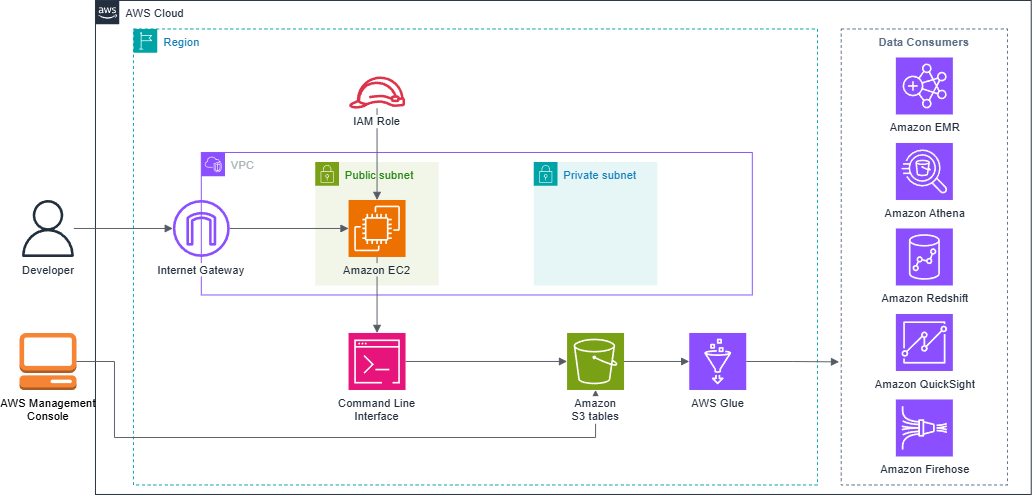Overview
In this workshop, we will explore Amazon S3 Tables—an optimized solution for storing tabular data, specifically designed to meet the needs of large-scale data analytics. Typical use cases include storing daily transaction data and processing streaming data. To make data querying convenient, Amazon S3 Tables seamlessly integrates with powerful tools like Amazon Athena, Amazon EMR, and Apache Spark.
Objectives
- Learn how to organize and manage data using Amazon S3 Tables.
- Create Amazon S3 Tables via the AWS Management Console and the Command Line Interface (CLI).
- Practice querying data by integrating with services like Amazon Athena, Amazon EMR, or Apache Spark.
- Develop AWS resource management skills, including resource cleanup to optimize costs after completion.
Requirements
Before starting, ensure you have:
- AWS Account:
- Register and activate an IAM User with necessary access permissions.
- Basic Knowledge:
- Familiarity with Linux, Amazon S3, IAM, and EC2.
- Work Environment:
- A personal computer with administrative access and a stable internet connection.
- The following tools installed:
- AWS CLI v2: For interacting with AWS via command line.
- jq: A tool for processing JSON files.
Pricing
NOTE: This workshop may incur costs. To optimize your budget, ensure resources are tightly managed and cleaned up after completion.
Resources Used
For this workshop, we’ll use a t2.medium EC2 instance, which provides:
- 2 vCPUs: Ideal for data management and processing tasks.
- 4 GB RAM: Suitable for efficient data querying and manipulation.
Costs Related to S3 Tables
Storage Pricing:
- $0.025 per 1,000 objects.
Requests Pricing:
- $0.005 per 1,000 requests (PUT, COPY, POST, LIST).
- $0.0004 per 1,000 requests (GET, SELECT).
Maintenance Pricing:
- Compaction - Objects: $0.004 per 1,000 objects processed.
- Compaction - Data Processed: $0.05 per GB of data processed.

Estimated Total Costs
- EC2 Instance: At a rate of $0.0464/hour, the total cost for 24 hours is approximately $1.11/day.
- S3 Tables: Costs will depend on the volume of data and the number of requests during operations.
Cost Optimization Tips
- Limit the duration of the workshop and clean up resources immediately after completion.
- With proper management, total costs can be kept to just a few dollars, ensuring an efficient and budget-friendly experience.
Main Content
- Introduction
- Preparation
- Accessing Buckets and Tables via AWS Management Console
- Accessing Buckets and Tables via Command Line Interface
- Conclusion
- Cleaning Up Resources
